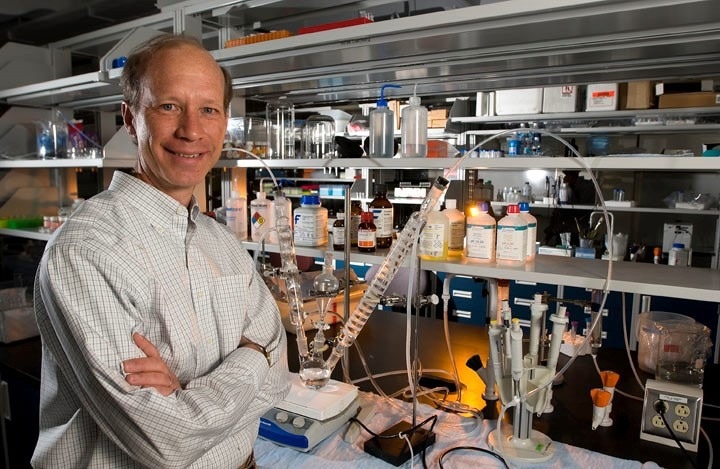Reviewed by Alex SmithDec 1 2022
As per an international research team headed by Michael Hochella of the Department of Energy’s Pacific Northwest National Laboratory, the immediate necessity to eliminate surplus carbon dioxide from the Earth’s environment could consist of enrolling a few of the smallest inhabitants of the planet.
 Michael Hochella is an internationally recognized environmental geochemist. Image Credit: Virginia Tech Photographic Services.
Michael Hochella is an internationally recognized environmental geochemist. Image Credit: Virginia Tech Photographic Services.
Hochella and his collaborators analyzed the scientific proof for seeding the oceans with iron-rich engineered fertilizer particles next to the ocean plankton. The aim would be to feed phytoplankton, microscopic plants that are a main part of the ocean ecosystem, to promote the uptake of the growth and carbon dioxide (CO2).
The study has been reported in Nature Nanotechnology.
The idea is to augment existing processes. Humans have fertilized the land to grow crops for centuries. We can learn to fertilize the oceans responsibly.
Michael Hochella, Laboratory Fellow, Pacific Northwest National Laboratory
Naturally, nutrients gathered from the land reach oceans via rivers, and blowing dust helps fertilize plankton. The research group suggests moving this natural process another step closer to help eliminate surplus CO2 through the ocean.
The researchers studied evidence indicating that adding particular combinations of cautiously engineered materials could efficiently fertilize the oceans, encouraging phytoplankton to serve as a carbon sink. The organisms would undertake carbon in huge quantities.
Furthermore, as they die, they drop deep into the ocean, taking the surplus carbon with them. Researchers say this suggested fertilization would expedite a natural process safely. Also, it sequesters carbon in a form that could eliminate it from the air for thousands of years.
At this point, time is of the essence. To combat rising temperatures, we must decrease CO2 levels on a global scale. Examining all our options, including using the oceans as a CO2 sink, gives us the best chance of cooling the planet.
Michael Hochella, Laboratory Fellow, Pacific Northwest National Laboratory
Pulling Insights from the Literature
In their study, the scientists dispute that engineered nanoparticles provide various attractive attributes. They could be highly regulated and particularly tuned for various ocean surroundings. Surface coatings could aid the particles to fix to plankton. Also, few particles consist of light-absorbing properties, enabling plankton to exhaust and use more CO2.
Furthermore, the general method could be tuned to fulfill the requirements of particular ocean environments. For instance, the researchers stated that one region might have an advantage over the majority of the iron-based particles, while silicon-based particles might be highly effective in another place.
The researchers’ examination of 123 published studies displayed the fact that several harmless metal-oxygen materials could safely improve the growth of plankton. The constancy, earth abundance, and comfort of the creation of such materials make them feasible options as plankton fertilizers, argue the researchers.
Also, the group examined the cost of making and circulating different particles. While the process would be considerably higher-priced compared to the addition of non-engineered materials, it would also be considered highly effective.
Besides Hochella, the research group included scientists from England, Thailand, and many other US-based research institutions. This study was financially supported by the European Research Council under the European Union’s Horizon 2020 research and innovation program.
Journal Reference:
Babakhani, P., et al. (2022) Potential use of engineered nanoparticles in ocean fertilization for large-scale atmospheric carbon dioxide removal. Nature Nanotechnology. doi.org/10.1038/s41565-022-01226-w